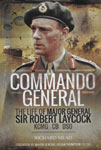|
COMMANDO GENERAL
The Life of Major General Sir Robert Laycock KCMG CB DSO
by Richard Mead
Foreword by
Major General Julian Thompson CB OBE
|
 Robert Laycock joined The Royal Horse Guards (The Blues) in 1927, leading a typical lifestyle for the period: ceremonial duties, hunting, polo, the occasional exercises never too far from London, and a busy social life. By the early 1930s, Laycock was tiring of this round of activities, and having developed an interest in sailing, he determined to take an extended cruise on a sailing ship. Given six months leave (of which four would be unpaid and would not count towards his promotion), he set sail on a four-masted barque sailing from Finland to Portuguese East Africa. The experience gave him a taste of life before the mast and an understanding of the sea that was to prove useful later in his military career as a Commando. Although Laycock enjoyed many of the conventional pursuits of his military class, he was certainly different. Robert Laycock joined The Royal Horse Guards (The Blues) in 1927, leading a typical lifestyle for the period: ceremonial duties, hunting, polo, the occasional exercises never too far from London, and a busy social life. By the early 1930s, Laycock was tiring of this round of activities, and having developed an interest in sailing, he determined to take an extended cruise on a sailing ship. Given six months leave (of which four would be unpaid and would not count towards his promotion), he set sail on a four-masted barque sailing from Finland to Portuguese East Africa. The experience gave him a taste of life before the mast and an understanding of the sea that was to prove useful later in his military career as a Commando. Although Laycock enjoyed many of the conventional pursuits of his military class, he was certainly different.
The war began with a staff job, but a combination of luck, good contacts (including David Niven), and talent, led him to an interview for a transfer to the newly-raised Commandos. Initially successful, Laycock then found his transfer blocked by the Military Secretary; his response, as a mere captain, was to seek an interview with the CIGS, Sir John Dill, who he had met some years earlier. Not surprising that Laycock acquired the name ‘Lucky’, but he was a master at seizing opportunities, and very tenacious. Within a matter of weeks, Laycock was a lieutenant colonel, commanding 8 Commando, and was later to become the youngest British or Commonwealth officer to be promoted to major general when, in late 1943, he took over from Mountbatten as Chief of Combined Operations, at the age of 36.
Richard Mead’s excellent biography Commando General tells Robert Laycock’s story from his time as a schoolboy at Eton through to his tenure as Governor of Malta in the late 1950s. The backdrop for most of his wartime service is the Commandos, a concept that Laycock did so much to support and develop. It was never easy, not least since this fledgling force, perhaps more so than any other military grouping raised during the Second World War, relied upon the co-operation and support of all three Services. The Commandos were frequently misused, most notably in Crete, and without some influential support from Mountbatten and others, and the determination of Laycock, they would not have survived the war, let alone the peace that followed. Laycock failed to save the Army Commandos, but is rightly credited with creating the foundations upon which the Royal Marine Commando thrived in the post-war period.
There were some colourful and a few surprising characters in the RM Commandos during the war, most notably Randolph Churchill, a useful ally for obvious reasons, and Evelyn Waugh, who was perhaps less so. Not popular with his fellow officers, Waugh was clearly something of a military liability who, to quote the author ‘was essentially a middle class intellectual, quite different in background from the landowning ‘smart set’ who formed much of 8 Commando’s officer group’. However, Waugh became Laycock’s friend, being retained by him in the Special Service Brigade perhaps from a sense of loyalty than for any other reason. It is not entirely incidental that Evelyn in due course transferred to The Blues and his son Auberon also served with them (but not the Royal Marines!) during his National Service in the 1950s.
This is a most readable book which, as Julian Thompson says in his Foreword ‘is a balanced and perceptive biography of a soldier whose work endures to this day’. It also highlights a ‘back story’ to the war (indeed, any war): that bureaucracy, committees, and all the tiresome detail, demands for special people to cut through the red tape and get things done. The fact that ‘Lucky’ Laycock was one of those types, using his charm, contacts, and ‘sheer bloody obstinacy’ to achieve the aim, makes not only for a good story, but has left a lasting legacy.
The Editor
COMMANDO GENERAL. The Life of Major General Sir Robert Laycock KCMG CB DSO. Published by Pen & Sword, £25
|
|